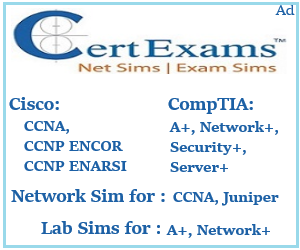Reference data type:Reference variables
are used to access objects and are created constructors
of the classes. These are declared to be of a specific type
that cannot be changed. These can refer to any object of
declared type or any compatible type. Class objects and
array variables are some examples.
Literals:A literal is source code representation
of a fixed value.
c. Operators
1. Unary operators.
1. Increment and Decrement operators ++ -- :We have postfix
and prefix notation. In post-fix notation value of the variable/expression
is modified after the value is taken for the execution of statement.
In prefix notation, value of the variable/expression is modified
before the value is taken for the execution of statement.
x = 5; y = 0; y = x++; Result will be x = 6, y = 5
x = 5; y = 0; y = ++x; Result will be x = 6, y = 6
2.Implicit narrowing conversion is done, when applied to
byte, short or char.
3. Unary minus and unary plus + -
+ Has no effect than to stress positivity.
- Negates an expression's value. (2's complement for integral
expressions)
4. Negation!:Inverts the value of a Boolean expression.
5. Complement ~: Inverts the bit pattern of an integral expression.
(1's complement - 0s to 1s and 1s to 0s). Cannot be applied
to non-integral types.
6. Cast (): Persuades compiler to allow certain assignments.
Extensive checking is done at compile and runtime to ensure
type-safety.
2. Arithmetic operators - *, /, %, +, -
- Can be applied to all numeric types.
- Can be applied to only the numeric types, except '+'
- it can be applied to Strings as well.
- All arithmetic operations are done at least with 'int'.
(If types are smaller, promotion happens. Result will be
of a type at least as wide as the wide type of operands)
- Accuracy is lost silently when arithmetic overflow/error
occurs. Result is a nonsense value.
- Integer division by zero throws an exception.
- % - Reduce the magnitude of LHS by the magnitude of
RHS. (Continuous subtraction). % - Sign of the result entirely
determined by sign of LHS 5 % 0 throws an Arithmetic Exception.
- Floating point calculations can produce NaN (square
root of a negative no) or Infinity (division by zero). Float
and Double wrapper classes have named constants for NaN
and infinities.
- NaN's are non-ordinal for comparisons. x == Float.NaN
won't work. Use Float.IsNaN (x) But equals method on wrapper
objects (Double or Float) with NaN values compares Nan's
correctly.
- Infinities are ordinal. X == Double.POSITIVE_INFINITY
will give expected result.
- + Also performs String concatenation (when any operand
in an expression is a String). The language itself overloads
this operator. toString methods of non-String object operands
are called to perform concatenation. In case of primitives,
a wrapper object is created with the primitive value and
toString method of that object is called. ("Vel" + 3 will
work.)
System.out.println (1 + 2 + "3"); // Prints 33
System.out.println ("1" + 2 + 3); // Prints 123






